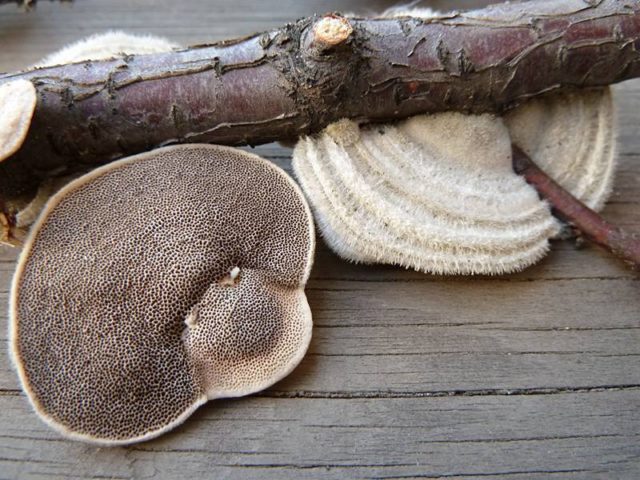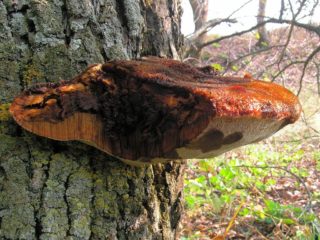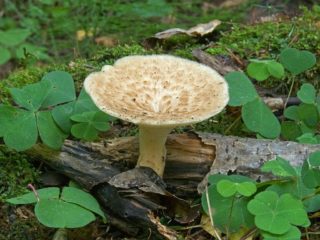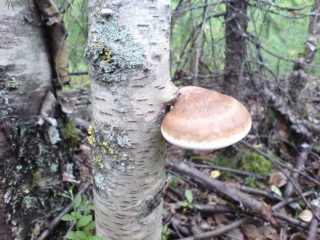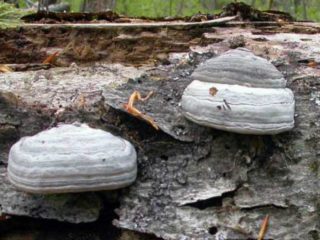Content
Trametes versicolor is a woody fruiting body from the large Polyporov family and the Trametes genus. Other names of the mushroom:
- Tinder fungus multicolor, azure;
- Tinder fungus motley or multi-colored;
- Coriolus multicolor;
- Turkey or peacock tail;
- Cuckoo's tail;
- Boletus is dark brown;
- Pied Mushroom;
- Mist mushroom or wungji;
- Kawaratake or a mushroom growing by the river;
- Cellularia cyathiformis;
- Polyporus caesioglaucus;
- Polystictus neaniscus.
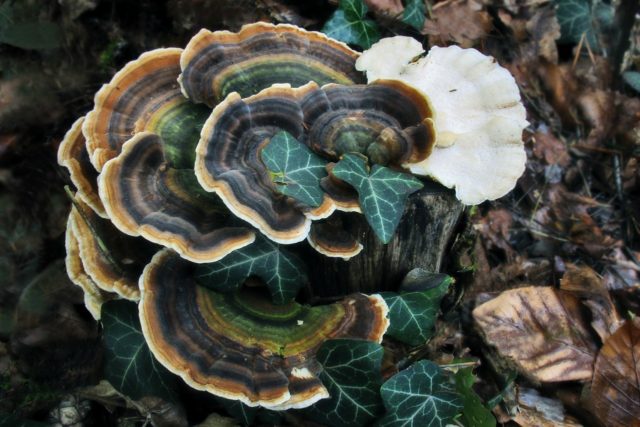
Trametess multicolored, braided with ivy
Description of the multicolored trametess
Trametes multicolored consists of a cap extended sideways to the substrate. The leg is absent even in its infancy. The shape is fan-shaped, rounded-folded. It can very rarely form a petal rosette. The surface of the cap is dry, glossy, pleasantly silky. Partially covered with fine velvety pile. The edge is pointed or rounded, usually white, cream. The radius of the cap can vary from 2.5 to 10 cm.
Trametes multicolored in appearance resembles a whimsically ornate bird's tail or a half-cropped shot of Jupiter. Concentric semicircles of various widths and of the most amazing coloration go from the point of growth to the edge. All the colors of the rainbow are far from the limit for this original. The most common shades of black and dark brown, red-ocher-yellow, blue-green. It can be gray-silver, cream, lilac or azure color.
The heminophore is tubular. In a young mushroom, the mouths are barely distinguishable, the surface is velvety, white-creamy and yellowish. Then the pores expand, becoming noticeable, angular, of various shapes, and the color darkens to brown-ocher and reddish-brown.
The pulp is dense, rubbery, very thin. Does not break and is difficult to tear. At the fault, the fresh mushroom is yellowish brown. The dried fruit body has a white-beige color. The aroma is barely perceptible mushroom, the taste is practically not felt.
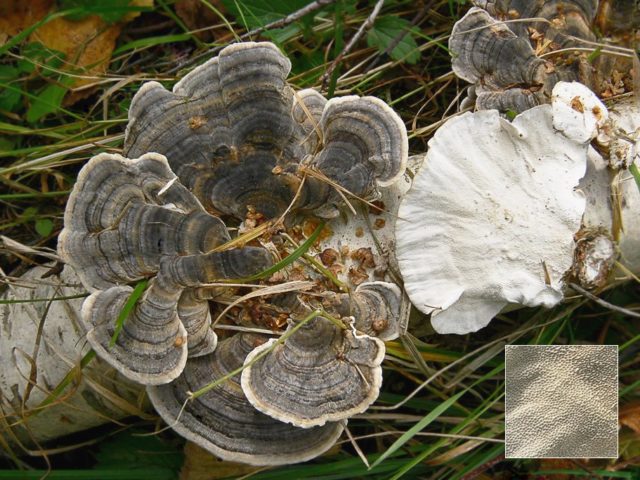
The inner surface of the multi-colored tramesto is folded, the pores are almost invisible
Where and how it grows
Trametes multicolored is widespread throughout the world. But in Russia it is little known and is practically not used. You can meet him all year round. Prefers deciduous, moist forests. Loves loose wood of poplar, willow, aspen.It also feels great on birches, oaks, hornbeams. Occasionally found on conifers. The rapid development of fruiting bodies occurs from mid-summer to late autumn.
Can settle on dead trees, dead wood, stumps, loves old felling and fires. It grows on the damaged bark of living trees in large, rapidly growing groups, capturing new territories during the season. Often, individual fruiting bodies form a single organism. The mycelium remains in one place for many years until the wood is completely destroyed.
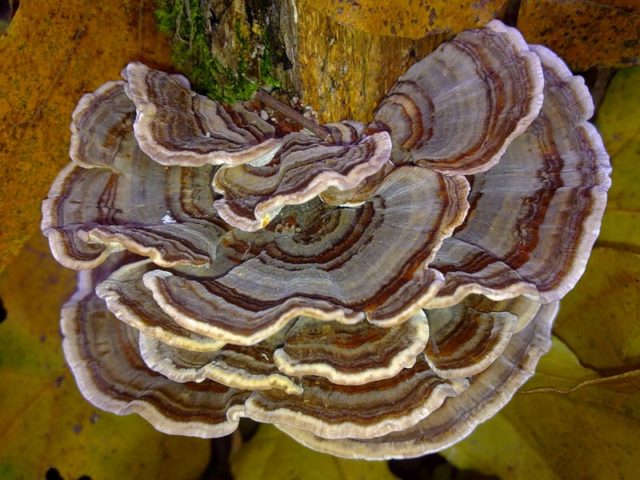
The tree on which this handsome man settled very quickly dies
Is the mushroom edible or not
Trametes multicolored belongs to the category of inedible mushrooms. Recent studies have found biologically active substances in its composition. These fruiting bodies do not contain toxic or poisonous compounds.
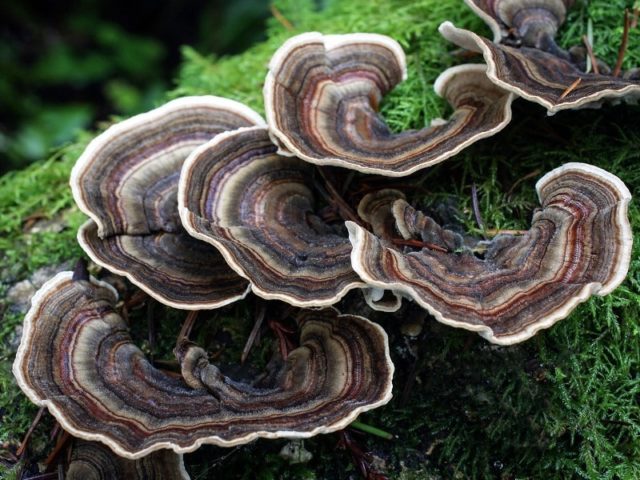
Tough, woody flesh makes multicolored trametess unsuitable for culinary use
Doubles and their differences
Due to its unusual color, the multicolored trametez is easily distinguishable from similar fruiting bodies of the Tinder species.
Tinder fungus scaly motley. Conditionally edible tree mushroom. It can be distinguished by pronounced scales on the outer surface of the cap and a more faded color.
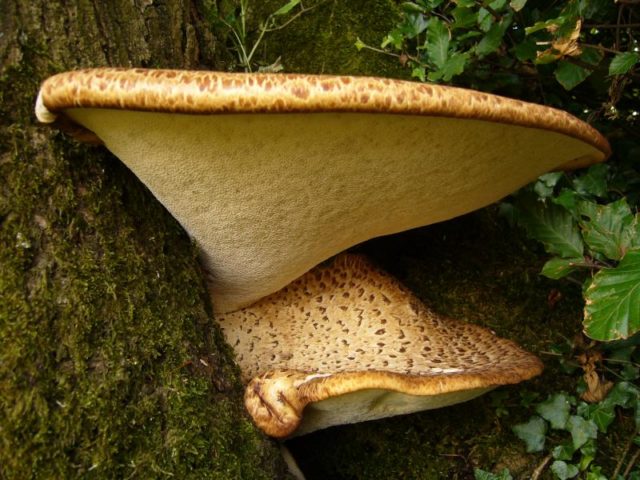
The scaly tinder fungus has a thick eccentric leg, which attaches it to a tree.
Trametes is harsh-haired. Inedible. Differs in gray color and hard fuzz on the top of the cap.
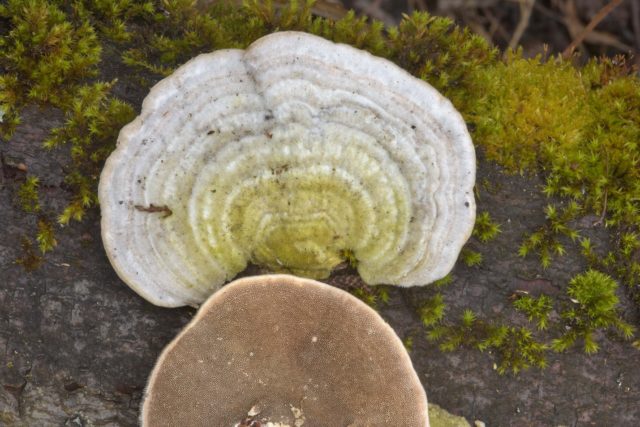
Tubular spore-bearing layer of beige-brown color, spore mouths are uneven, angular
Fluffy trametes. Inedible. It is an annual, can be distinguished by its pubescent cap and dull, gray-olive color.
Geminophore spongy, with clearly visible pores, gray-brown color
The healing properties of the multi-colored tinder fungus
Despite the extremely cautious attitude of the official pharmaceutical science, multicolored turkey is widely used in traditional medicine of various peoples as a medicine. He found especially widespread use in the East: in China, Japan. In Russia, the mushroom is almost unknown, only in some regions can you find mentions of its use as a healing infusion or ointment. It contains:
- Phenolic and flavonoid antioxidants that help strengthen the immune system, reduce inflammation and protect the body from premature aging.
- Polysaccharides that strengthen immunity at the cellular level, help fight various diseases, including cancer, reduce and remove inflammatory processes.
The prebiotics contained in the pulp of the multicolored trameta help to normalize digestion, have a beneficial effect on the development of beneficial microflora of the gastrointestinal tract and inhibit the growth of pathogenic bacteria.
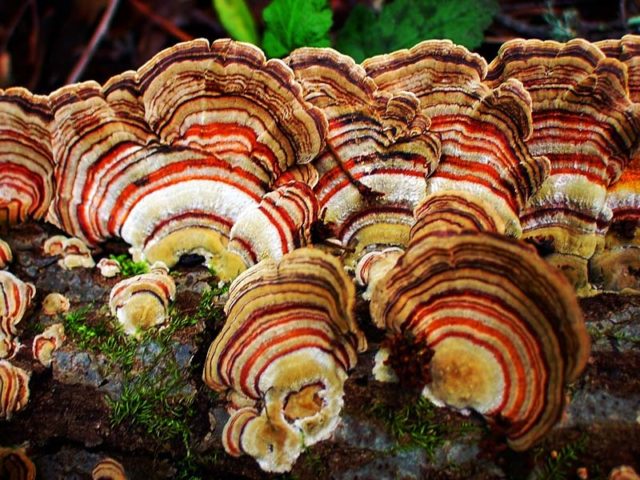
The mushroom is not only beautiful, but also has a number of useful properties.
The use of a variegated tinder fungus
Thanks to laboratory research in recent years, about 50 unique polysaccharides, including coriolanum, have been isolated from fruit bodies and mycelium. It has a beneficial effect on the immune system of cells and helps the body fight against recurrent metastases after surgery.
Trametus products help reduce inflammation and fight a number of disease-causing bacteria and viruses. They allow you to increase efficiency and remove fatigue, and also have a beneficial effect on patients with diabetes mellitus.
Fruit bodies can be harvested in August and September. You should collect young, not overgrown mushrooms. Having cleared of forest debris, they can either be dried or used as a decoction.
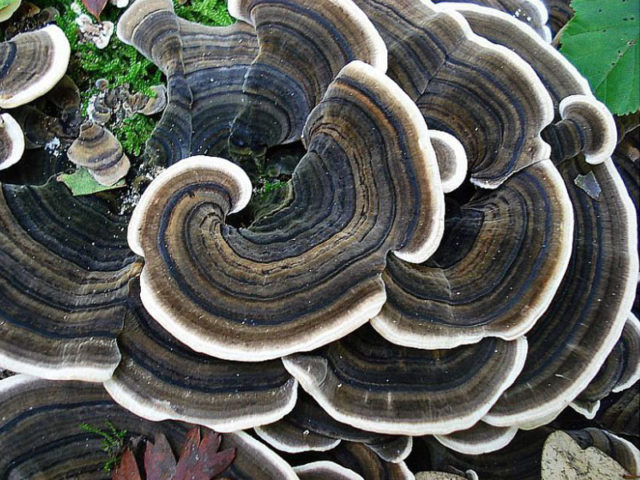
Trametes multicolored is rightfully considered a unique broad-spectrum drug.
In traditional medicine
In China and Japan fungotherapy is recognized as official medicine, the history of using mushroom pulp for therapy goes back more than 20 centuries. The medicinal properties of the multicolored trameta are different, as well as the methods of its preparation. Powders, ointments and tinctures are prescribed to patients with the following diseases:
- liver problems, including chronic hepatitis;
- decreased immunity;
- viral infections: herpes, lichen, influenza and cytomegalovirus;
- fungal infections - candidiasis, ringworm and others;
- prevention and treatment of cancer;
- rheumatism, diabetes mellitus, hypertension, wet cough;
- problems of the cardiovascular system;
- prescribe multicolored trametes for dermatomyositis, sclerosis, lupus;
- used in the complex treatment of the gastrointestinal tract.
In folk medicine
Method of preparation of alcoholic tincture from a multicolored trametes mushroom:
- dried powder - 20 g;
- vodka 40% - 300 ml.
Mushroom powder should be infused with alcohol for 14-30 days. Before taking, be sure to shake up, pouring along with the sediment. Take 3 times a day 20-25 minutes before meals, 1 tsp. within 15 days.
Method for preparing a decoction of multicolored tramesto:
- crushed fruit bodies - 4 tbsp. l .;
- water - 1 l.
Pour mushrooms with water, cook over low heat for 1 hour. Strain through cheesecloth or fine sieve, cool. Take 2 times a day, half an hour before meals, 1 glass.
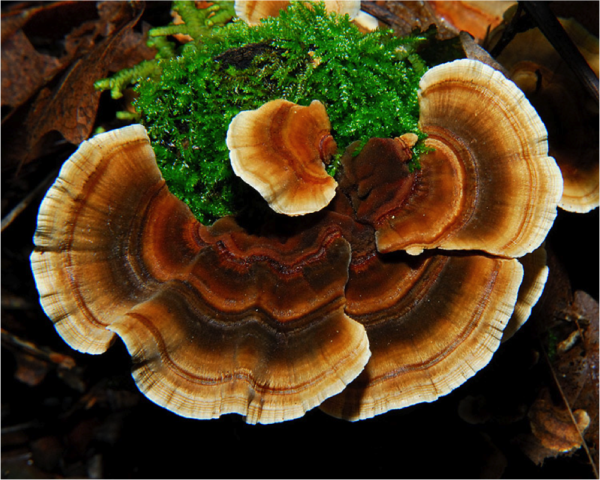
The healing effect of folk recipes from multicolored trametess is very effective.
With oncology
The medical practitioners of many nations recognize the multicolored trametus as a cure for various cancers. In Japan, infusions, ointments and decoctions are necessarily prescribed along with radiation, before and after procedures. People taking 1-4 g of powder along with traditional treatment showed better dynamics.
For cancer ulcers, an ointment made from animal fat and dried crushed mushroom is good.
Shown is the powder of trametess multicolored for breast cancer.
Decoctions and infusions of the fruiting body help prevent cancer of the internal organs of the gastrointestinal tract.
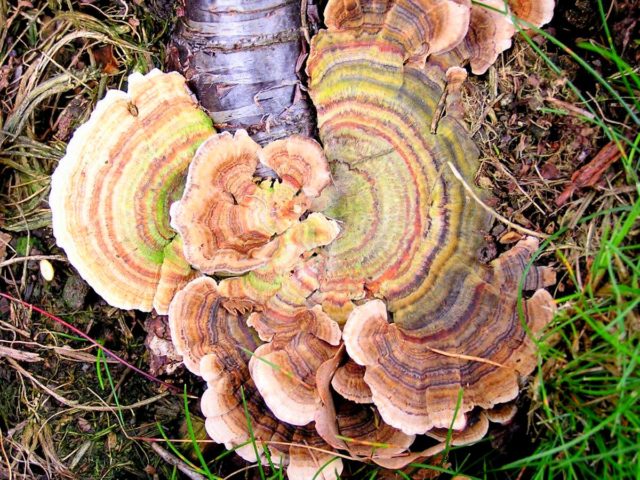
Infusions and decoctions of multicolored trametess can also be taken with benign formations: adenomas, papillomas, polyps
Conclusion
Trametes multicolored is a unique medicinal mushroom. Grows on old tree stumps, rotting wood, and damaged or dying trees. Loves wet places and hardwood. It is inedible due to its tough pulp, but does not contain any toxic substances. No toxic twins were found in him either. It is used in folk and official medicine in different countries. It is not recognized as a drug in Russia.
